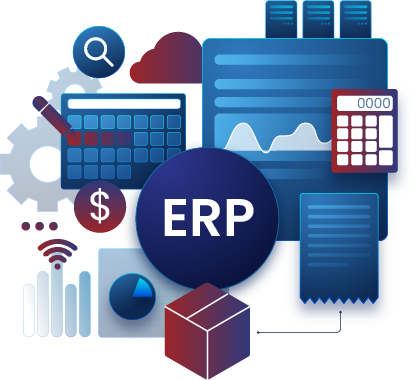Navigate Trade Tariff Challenges with Epicor Prophet 21
It’s nothing new to state that the current trade tariffs are affecting the current global economy, with many businesses feeling the impact.
Market uncertainty, volatile prices, supply chain disruptions, and margin pressures are just a few complex issues that are causing businesses within the distribution industry to scramble and loose credible business and profits.
Epicor Prophet 21 is a modern ERP solution that is designed for distribution businesses with a powerful integration that help business of all sizes manage both inbound and outbound tariffs.
How do Trade Tariffs
Impact Distributors ?
Trade tariffs are taxes on imported goods and services imposed by governments to not only help regulate international trade, but to also protect domestic industries.
Tariffs have been around for a long time, but it’s only as of late that recent tax increases have caused certain economies to collapse.
For companies in industries such as: steel and aluminum as well as automotive, the impact has been felt at a much higher rate than others.
Here are just a few challenges that are being faced by companies within the distribution industry:
Fluctuating Landed Costs
Landed costs are the total costs of getting a product to a facility, warehouse, or store. It includes all the associated expenses needed to get a product to its destination.
It’s a known fact that these costs are never static, however, with unforeseen changes in tariffs, these costs have been fluctuating more than usual and are affecting pricing strategies and profit margins.
Increased Sourcing Complexity
Sourcing complexity is defined by the intricate procedures faced by businesses that need to acquire raw materials, finished goods, and components.
Changes in global supply chains, supplier fragmentation, and erratic tariff are causing businesses to experience increased sourcing complexity that lead to higher procurement costs and longer lead times.
Need for Real-Time Data and Visibility
The fast-changing global trade environment is impacting everything from trade policies to customer satisfaction to inventory management. Without the proper visibility, companies are left in the lurch, unsure of how to proceed.
Nowadays, businesses must invest in accelerated digital transformation such as an ERP, in order to predict unforeseen changes and have full control over data and business operations.
Customer Pricing Concerns
With the increased tariff rates, customers are the ones that absorb the extra cost. And because of this, customer churn, increased customer calls, loss of consumer trust are just a few things that business are experiencing right now due to the economic downturn.
STRUGGLING WITH TARIFF MANAGEMENT IN PROPHET 21 ?
The Importance of Epicor ERP Prophet 21
ERP software like Epicor’s Prophet 21 is a lifeboat for distribution companies navigating the price increases due to imposed tariffs.
Users can easily track costs, ensure proper supplier and sourcing management, and utilize business intelligence (BI) and reporting tools to stay ahead of the potential issues.
Here are just a few ways in which Prophet 21 ensures business avoid surprises and stay competitive, even during international trade tariff deficits.
Landed Cost Tracking
Automatically calculates the total cost including tariffs, freight, insurance, and handling fees.
Supplier and Sourcing
Management
Available tools manage multi-source strategies and identify alternate suppliers. Additionally, it supports flexible sourcing to ensure fast response time to tariff changes and shortages.
Advanced Pricing Engine
Features include dynamic pricing capabilities to pass on tariff costs or adjust margins by customer segment, with the ability to simulate pricing changes based on tariff scenarios.
Business Intelligence & Reporting
User-friendly dashboards and reports highlight tariff-related costs, supplier performance, and pricing impact. Proactive analytics provide insight into new tariff developments or trade policies.
Integration with Global Trade Partners & Customs
High-level integration support with trade compliance tools and customs data via APIs or EDI, which help businesses avoid delays and ensure accurate declarations.
Three Methods to Manage Tariffs in Prophet 21
Inbound Tariffs
In most cases, this is done via voucher entry from the broker, but some may choose to create a purchase order (PO) to receive the tariff to resell it later. Here are the different options:
#1 Voucher By Amount
Users can navigate to the Voucher by Amount feature, where they can efficiently manage payments to the custom broker. This feature specifies which value should apply to which general ledger, ensuring accurate financial tracking and reporting.
#2 Purchase Order Item
Users can add tariff as a Line Item in the PO to clearly track tariff costs on each order. This enables the option to resell an item to the customer, which includes the tariff charge on the order. The customer will absorb the higher tariff cost ensuring transparency and strong profit margins.
This is beneficial for direct shipments in which the business can efficiently manage one-time tariff charges.
# Landed Cost Drivers
This type of option includes the following: freight costs, insurance, handling fees, duties and taxes, and finally, brokerage fees.
It will accurately determine the total cost of imported goods to ensure precise pricing and profitability. These values will increase the cost of goods sold leading to an impactful financial performance.
Outbound Tariffs
To manage outbound tariffs in Prophet 21, users have the option to use three different types of procedures: Other Cost Item, Tax Groups, or Eco Fees.
By leveraging these tools, businesses can accurately track and apply tariff costs to outbound shipments.
#1 Other Cost Item
This is a simple method but requires manual intervention on every transaction by some familiar with the process. The risk of error is much higher (compared to the other options), but this is a viable solution if only a small number of items are affected by tariffs.
#2 Special Tax Jurisdiction
The advantage of the tax group method is that it automates tariff management and only requires users to manage tax groups at the item level.
The disadvantage is that the tax appears as a lump sum in the bottom right-hand corner of customer documents.
# 3 Eco-Fees
This is the recommended approach as it’s complete, automated, and detailed. It supports multiple tariff levels and provides line-by-line documentation. Users require a simple Business Rule (BR) and some form adjustments, which can be done by an IT team.
Tariffs are calculated based on sales price or purchase cost. If based on cost, customers can deduce profit margins. The alternative is to apply a lower tariff rate on the sales price.
LEARN MORE ABOUT HOW OUR PROPHET 21 CONSULTANTS
Strategic Insight with Prophet 21 and ERP Software
Like most ERP software, Prophet 21 is designed to facilitate business operations. Its powerful capabilities safeguard uncertain market trends and events, such as trade deficits.
For current Prophet 21 users, properly documenting tariffs in Prophet 21 is crucial for ensuring compliance, accurate costing, and efficient operations.
Clear and consistent tariff records help minimize errors, support better decision-making, and product businesses from potential regulatory risks.
In a system like P21, where data drives purchasing, pricing, and reporting, maintaining well-documented tariffs ultimately strengthens the foundation for smarter, more profitable business practices.

EC Solutions: Your Partner for Prophet 21 and Tariffs
At EC Solutions, we have more than 2 decades worth of experience in servicing Prophet 21. Our expertise extends well beyond an ERP system, with knowledge in intricate integrations and powerful programs.
Contact our team today to facilitate your tariff challenges.


